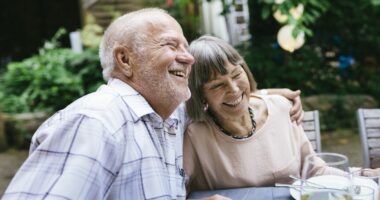Share this @internewscast.com
A quarter of women experiencing menopause say the best thing about it is getting a “second wave of sisterhood”, according to research. A study of 2,000 people, who are peri-menopausal, menopausal, or who have been through the menopause, found 14 percent have made more friends by sharing their experiences of the life stage than they could ever have imagined.
Three in 10 admitted it felt like a new community of people formed around them – women who were experiencing the same things, and who wanted to share their journey.
Meanwhile, 64 percent feel the recent rise of celebrities, such as Linda Barker and Davina McCall, talking openly about what has happened to them, has had a positive impact.
And although menopause, with its 62 symptoms, brings with it a host of problems, 61 percent admit they are more than willing to share what is happening to them with friends, family, and work colleagues.
The research was carried out by hygiene and health company, Essity, which continues its quest to keep the conversation about menopause open.
Spokeswoman Debbie Thomas said: “Menopause can clearly be a challenge for a lot of women, and we certainly don’t want to suggest that it can be an easy time for those experiencing it. But as we can see from our research, there is comfort to be had from sharing stories with others in the same boat.
“And women are no longer as embarrassed to talk about what is happening to them, as previous generations might have been – it feels like that mindset of hiding the truth is finally changing.”
The research found that, for those first experiencing menopause symptoms, feelings were overwhelmingly negative at first – with 36 percent worried it made them old, while 18 percent were upset, and one in 10 were even in denial.
But 26 percent of those polled, via OnePoll.com, were quickly surprised to discover how open some women are when discussing their experiences. And it only took around three months before they became comfortable sharing their own stories.
By doing so, these women immediately felt supported by others (43 percent), as well as a sense of solidarity (37 percent).
Women are most likely to talk to their female friends about their experiences (71 percent), but 40 percent will chat to work colleagues – and will even happily do so in a workplace setting (38 percent).
It emerged that 41 percent tended to stay on the sidelines of any conversation they were hearing about menopause soon after realising they also had symptoms – but 42 percent are generally relieved when others open up, as it makes them feel more normal.
As well as feeling reassured (29 percent) and supported (27 percent), 63 percent admitted talking with like-minded people about what they are going through is as important to their mental health and well-being as any medication could be.
Sharon Clapp, 56, from Sidmouth, trained as a menopause practitioner after going through the menopause early due to a hysterectomy.
She said: “I trained as a menopause practitioner, I’m not a qualified GP – I don’t prescribe, or tell people that’s what they should be doing. I provide support and an ear to talk to, help with exercise, and point them in the right direction with diets.
“There is support out there, women are not alone – there are communities and individuals that can help. Now things are spoken about more openly, it’s more understood by partners, and people are understanding a lot more.
“I’m part of the Issviva Menopause online community, and there are other social media groups out there as well. There are a couple of really funny ones with ladies sharing their stories.
“It brings a lighter element, because you can relate to it and it makes you feel like you aren’t alone. Also, the Menopause charities are good for resources and understanding.”
Janet McQuillan, for Essity, which runs www.Issviva.co.uk, a platform offering advice and products to women going through the menopause, said: “Support for women comes in all shapes and forms – some like to chat to others in person in the safety of their home, while some are happy to prop up the water cooler at work.
“And for others, an online community can be a safer and less daunting way of getting involved. We now have around 3,700 active members on our community platform, with topics ranging from shared symptoms to personal relationships.”









